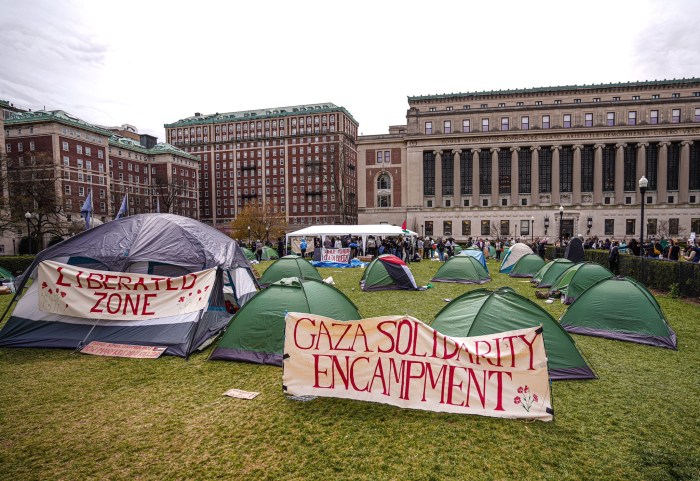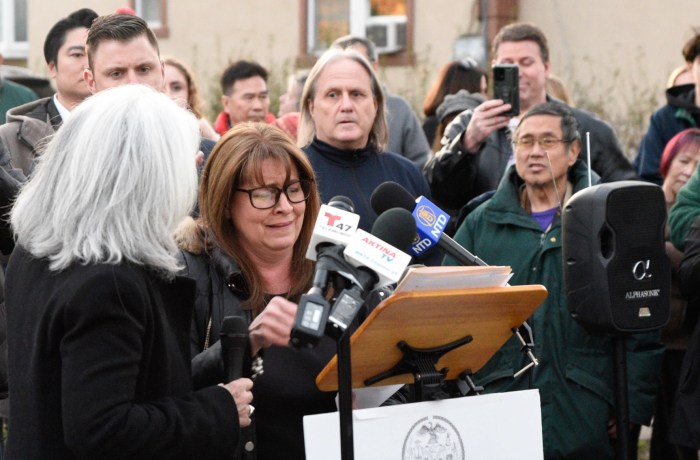BY ALINE REYNOLDS | A group of 9/11 families are protesting the National September 11 Memorial and Museum’s plan to preserve the remains of their loved ones 70 feet below the World Trade Center site.
The Memorial and Museum, in collaboration with the Mayor’s Office and the City Medical Examiner’s office, plans to place the more-than 9,000 unidentified remains discovered nearly 10 years ago, in an underground repository. The remains are currently being stored in temporary structures situated in a parking lot next to Bellevue Hospital.
Family members of the 2,740 people killed in or around Ground Zero on 9/11 were never consulted about the remains’ future whereabouts, according to Norman Siegel, an attorney representing a group of 17 families opposed to the plan. So on June 1, the group submitted a Freedom of Information Act request to the Mayor’s Office, asking for a list of the families’ names and addresses to be able to solicit input concerning where their loved ones’ remains should be placed.
“We believe the vast majority of family members were not notified about this plan and oppose it,” said Siegel, because the repository is connected to the museum. “The F.O.I.L. says that government documents belong to the people. I think we’re on strong legal grounds that we’re entitled to the names and addresses.”
The group is proposing that a retired judge send the notifications to the families and serve as an intermediary between the various parties. Under this setup, Siegel said, no one except the judge would be privy to the families’ contact information.
The Mayor’s Office quickly and publicly refused to comply with the request.
“Many family members would rightly be outraged if the City made their personal information, including home addresses, public, and of course that is not something we will do,” said spokesperson Andrew Brent.
If the Mayor’s Office does not comply with the F.O.I.L. request, Siegel is prepared to take the case to New York State Supreme Court, confident that it is not too late for the City and the memorial to make alternative arrangements for the remains.
“If we send out this letter, and a large percentage of families say they weren’t notified, then they’ve got a large embarrassment in their hands,” said Siegel. “But the law says we’re entitled to it, so if we have to, we’ll sue.”
“I think [the plan] is disrespectful and dishonorable,” said Sally Regenhard, vice chair of 9/11 Parents and Families of Firefighters and W.T.C. Victims, who lost her 29-year-old firefighter son, Chistian Regenhard, on 9/11.
“The bottom line is, families were never consulted, and we never received a letter,” said Regenhard.
The National September 11 Memorial and Museum is denying these allegations, however, saying the Families Advisory Council approved the decision made years ago to preserve the unidentified remains in an underground repository. “Families have been part of a robust process through which they were consulted during public and private meetings with officials, as well as offered opportunities for public comment, and they have repeatedly stated it is essential the remains return to the sacred bedrock of the site,” said memorial spokesperson Michael Frazier.
Frazier noted the institution believes the current plan “treats the remains with the utmost care, respect and reverence.” In an April 5 email distributed to 9/11 families, the Memorial and Museum staff notes that the repository is not open to the public, nor is it a part of the museum’s public spaces.
Museum officials also released a detailed outline documenting the institution’s outreach to the families dating back to 2002. But according to Siegel, the outline doesn’t clarify that the repository would be accessible from the museum, only from the “Memorial Complex.”
“They’ve conflated the issue — the memorial is a place of reverence, and the museum is a commercial venue,” Siegel said.
Regenhard said she sat on the Families Advisory Council and doesn’t recall a discussion of the plan. And, even if some family members had a say in planning the repository, those families don’t have the right to make a decision on behalf of the entire 9/11 community, she said.
Jim Riches, father of 29-year-old Engine 4 firefighter Jimmy Riches, who died on 9/11, accuses the museum of reneging on its commitment to keep the repository separate and distinct from the visitor’s center.
“I just think it’s professionally and ethically incorrect,” he said. “It’s outrageous I have to walk by a gift shop to go down and visit my son’s remains. And I don’t think my son would want to be back there.”

















